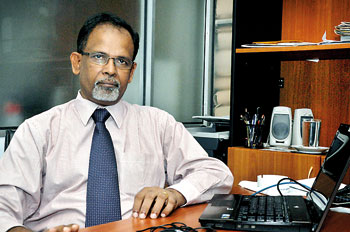The success of a fledgling paper is never assured. As the Sunday Times celebrates its 25th anniversary, Lal Jayawardene, a member of the Board of Directors at Wijeya Newspapers remembers the tests the young company faced — whether it was logistical obstacles such as a government quota system that restricted the amount of newsprint allotted to a company or the challenges faced by a small, freshly minted team, who were inspired by a shared determination to give their readers informed, unbiased news.
 |
| Lal Jayawardene:"We won our readers with a display of impartiality". |
When Mr. Jayawardene first joined the Wijeya Group in 1980, a year after it was founded, it was as the Accounting and Administrative Officer. More than 30 years later, he has seen both his own fortunes and that of the company he helped build transformed. What began as a small publishing house with just over a dozen employees employs today hundreds of people who together produce some of the country's most reputable publications.
In the early years, Wijeya was a humble publishing house built on the back of small sheets — Sathuta — that ran cartoons, explains Mr. Jayawardene, adding that it wasn't till 1986 that they bought the rights for the Times of Ceylon group. The latter had been part of the government portfolio along with Lake House papers and when the authorities decided to sell the rights to the Lankadeepa, Daily Mirror and the Sunday Times, they were snapped up by the company.
Getting the papers out onto the streets was a herculean task, one that was sometimes accomplished by the skin of their teeth — Mr. Jayawardene recalls one time when the newsprint was delivered so late that they were frantically unloading it from the vehicle and loading it directly onto the presses mere hours before the paper was scheduled to make its debut at newsstands across the country.
Mr. Jayawardene, who came from a background in the garment industry, learnt everything he knows about newspapers on the job. Initially, as a one man administration division he handled everything from staff payments to sourcing newsprint. In the long years it took to become established, the paper ran on the commitment of its owners and employees as well as the support of many whose goodwill smoothed the paper's day-to-day operations. Mr. Jayawardene remembers in particular that in those early days the Sunday Times was lucky to have Vijitha Yapa as its editor. "He would often visit the press room," says Mr. Jayawardene, adding that Mr. Yapa's combination of intellectual vision and business sense proved indispensable.
In the 1990s, President D.B. Wijetunga lifted the newsprint quota system, thereby disarming what amounted to a powerful weapon that could be used against a paper. Meanwhile, the Sunday Times had only gone from strength to strength. As the paper's readership burgeoned, Mr. Jayawardene would oversee the establishment of an advertising department as well as many improvements in the technical aspects of the paper's production. "We won our readers with a display of impartiality," he says. "We were not with or against the government and even today that is the basis of our success."
Today, Mr. Jayawardene continues to come into work, but says he's slowly scaling back as he approaches his 60th year. "I grew up with this company," he says, looking back on his long career with Wijeya. "There is a real sense of achievement… that we succeeded despite the many challenges we faced." |


